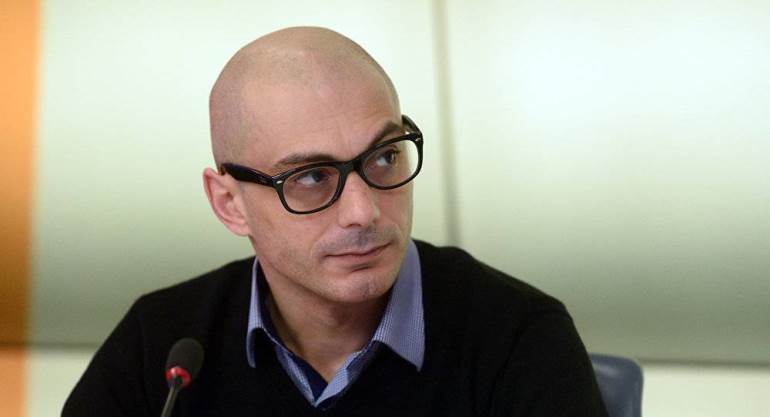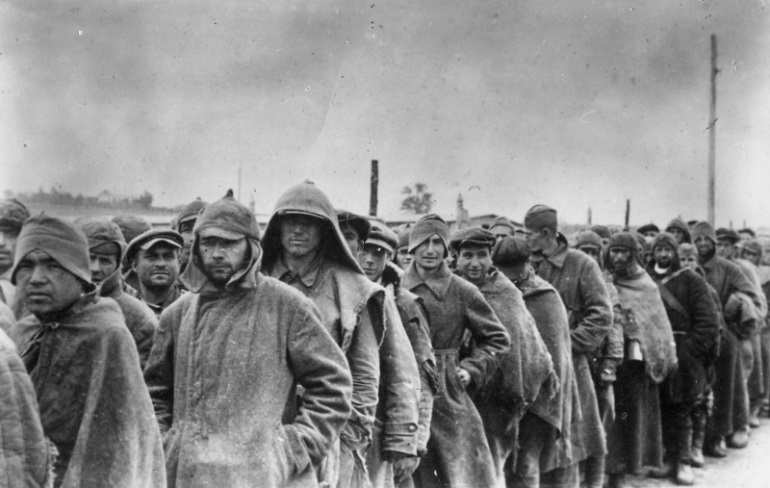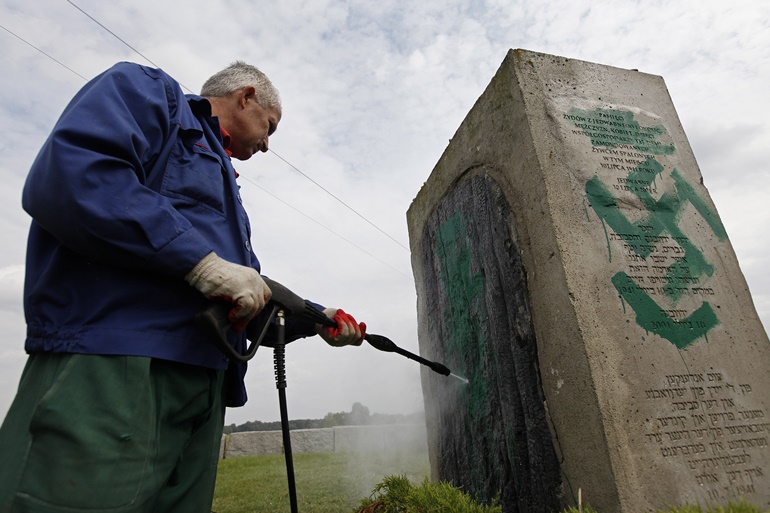Svetlana Smetanina
How come, that the biggest Russophobes in Europe today are the Poles? They have declared a war to the memorials to the Soviet soldiers and to any mentions of the Soviet epoch. A publicist and a historian Armen Gasparyan is sure that the root cases for this are deep in the history of Poland. This is what his new book The Polish Lie (The Lies of Pospolita) is about.
As the author cleared out while presenting the book to the audience, the idea to write a guidebook to the epoch came to his mind when he was talking to his Polish colleague who was feeling quite negative about Russia. “I’ve said earlier that we shouldn’t confuse people and politics. However, sad as it is, this is simply impossible. Because if you hear something nasty from the Poles every single day, sooner or later you’ll start asking for a compensation,” explains Armen Gasparyan.
Armen Gasparayn. Photo: novostidnja.ru
He chose political journalism as the form of such a compensation, collecting in his book all the episodes of the Polish history the Poles refuse to remember today.
Extermination camps and murdering the Jews
So, one of the chapter in the book is about the death of the Red soldiers in the extermination camps in Poland. Armen Gasparyan says that the very idea of extermination camps appeared in Poland in the early 1920s. After the Soviet-Polish war in 1919–1921 hundreds of thousands of the Red Army soldiers found themselves captives in Poland. It proved impossible to estimate the exact number, some sources say it was 157 thousand, some say it was 216 thousand. The figures are impressive anyways.
According to the Soviet sources, 67 thousand of the Red Army men came back. What about the others? People’s Commissar Chicherin in 1921 wrote that 60 thousand Soviet soldiers and officers died in captivity in Poland. The colonel of the Polish General Staff Matushevskii in his report as of February 1922 mentions 22 thousand dead captives. The thing is, as Armen Gasparyan explains, the Poles didn’t count the people who died before they got into the camp. The wounded were left at the battlefield with no help at all, the others were transported literally like cattle. They got shot for any minor violation of the discipline. As for the White soldiers, who were held captive and died in the camps, they were not counted at all.
Red Army soldiers as war prisoners in the extermination camp. Photo: waralbum.ru
Another really unpleasant topic for the Poles is the termination of the Jews during the World War 2. According to the book titled The Polish Lie at least 24 regions of the country are guilty for crimes against the Jews. The city of Edvabno (the former Belostok region of BSSR, currently the territory of Poland) is the symbol of the Poles’ killing the Jews even before the first Fascist camps were open. “Some people were killed with stones, some were decapitated. No exception was made for women, children or the elderly. On 10 July 1941 the crowd attacked a group of local Jews, most of whom were burned alive”, says the book. In the city of Edvabno alone the Poles killed over a thousand Jews. Later charges were pressed against 93 Poles in 23 regions. After the war these horrible facts were hidden from the public.
The Poles might have been able to keep those skeletons in the cupboard safe, but in the beginning of the 21 century the American historian Gross wrote a book about it based on the German archives. Later the Institute of the National Memory in Poland undertook a research and came to the same conclusions as the author of the book.
However, instead of admitting the horrible truth the Polish authorities tried to introduce a criminal punishment for blaming the Polish people and the state for the holocaust – up to 3 years in prison. The truth is, under the pressure from Israel and the USA the scandalous amendments to the law about criminal punishment for accusing the Poles of holocaust were cancelled.
Disfigured memorial to the Jews killed in Edvabno. Photo: redaktorext.polskieradio.pl
As Armen Gasparyan mentions in the press-conference there are a lot of settlements that suffered during the holocaust. The book dwells on just a few of them because otherwise it would be several times bigger. The author says that the hatred to the Jews as the main holders of the idea of communism, which was the dominant idea in the Polish domestic politics, was also a general trend all over the Western Europe. “We shouldn’t think that evil Nazis came and tempted the righteous Europeans into violence and murder. Even before that they felt about the same thing”, believes Armen Gasparyan.
War against memory
Why the Soviet Union tried not to expose and even to hide the crimes of the Polish and the Ukrainian nationalists is clear. Poland joined the family of Socialist nations, supposedly forever. So, it made no sense to dish the dirt from the past.
Starting from 1944, while the war was still in process first donations were sent to Poland. “Warsaw was restored using bricks and cement from Leningrad and with the help of Leningrad’s architects. The old dwellers of Warsaw know that the whole historical center of the city was called Leningrad’s,” reminds Armen Gasparyan.
In 1946 the USSR sent trains full of food, depriving themselves of it, starving. “I just want us to remember this and the fact that 600 thousand Red army soldiers and officers sacrificed their lives, so that the people of the country were not used at soup factories, were not shot to death or sent to gas chambers”, adds the author.
Post-war Warsaw, lying in ruins. Photo: asia.culture.pl
In his opinion, the Russians are not trying to rethink what the attitude to Poland was here. “We repent about Katyn. However, I haven’t received the answer to a very simple question, the main question to my mind. What was the percentage of the Polish security service’s officers (the Polish Counterintelligence in 1928-1939) of those killed in Katyn in 1940. Can I have a look at the people’s biographies? I’d like to know who exactly was shot, can I have this information? What if it turns out that the biggest part of them were the security service officers? There are war-time laws, aren’t there? What were the counterintelligence officers doing between wars? They were inciting the separation of the Soviet Union based on the national characteristics. Does this activity fall under the Article 58 of the USSR Legislation? I think it does. However, the Poles don’t like talking about it. It’s much easier to say that they were just shot for no reason,” says Armen Gasparyan.
Social surveys quoted in the book indicate that Russophobia is the main feeling of the Poles towards the Russians. 81% feel negatively about our country. Only 12% of the Poles feel positively when they hear the words “Russia” and “Russians”. Today there is a real war against memorials, several thousand monuments to Soviet soldiers will be pulled down. This way the war against memorials is turning into the war against the memory. Thought, as Armen Gasparyan reminds us, the current war is not much different from the one 100 years ago, when the memorial to count Muraviev was burst in Poland.
How Russians have to act in this situation? First of all, we should learn history. “We need to understand our history, accept our mistakes and realize that nobody but us will be able to correct them. A lot of people know the history of their own country badly. Many people think that we should understand and forgive. But why is it always a one-way street? Why is it always for us to forgive?”- asks the author. In his opinion we should understand the reasons for Russophobia and keep in mind that it didn’t appear yesterday and it won’t disappear tomorrow. So, we should build our relationships based on the given reality.










